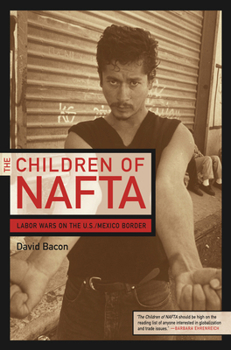The Children of NAFTA: Labor Wars on the U.S./Mexico Border
Select Format
Select Condition 
Book Overview
Food, televisions, computer equipment, plumbing supplies, clothing. Much of the material foundation of our everyday lives is produced along the U.S./Mexico border in a world largely hidden from our view. Based on gripping firsthand accounts, this book investigates the impact of the North American Free Trade Agreement on those who labor in the agricultural fields and maquiladora factories on the border. Journalist David Bacon paints a powerful portrait of poverty, repression, and struggle, offering a devastating critique of NAFTA in the most pointed and in-depth examination of border workers published to date. Unlike journalists who have made brief excursions into strawberry fields and maquiladoras, Bacon has more than a decade's experience reporting on the ground at the border, and he has developed sustained relationships with scores of workers and organizers who have entrusted him with their stories. He describes harsh conditions of child labor in the Mexicali Valley, the deplorable housing outside factories in cities such as Tijuana, and corporate retaliation faced by union organizers. He finds that, despite the promises of its backers, NAFTA has locked in a harsh neoliberal economic policy that has swept away laws and protections that Mexican workers had established over decades. More than a showcase for NAFTA's victims, this book traces the emergence of a new social consciousness, telling how workers in Mexico, the United States, and Canada are now beginning to join together in a powerful new strategy of cross-border organizing as they search for economic and social justice.
Format:Paperback
Language:English
ISBN:0520244729
ISBN13:9780520244726
Release Date:March 2004
Publisher:University of California Press
Length:356 Pages
Weight:1.43 lbs.
Dimensions:0.9" x 6.1" x 9.0"
Customer Reviews
1 rating
Great, real deep
Published by Thriftbooks.com User , 17 years ago
Struggle and hope. That's what I thought of this May the 1st of 2006, when seemingly millions of people across the US, mainly Latinos, rallied to support so-called illegal immigrants. These immigrants have literally spent a long time struggling both in the nations they came from and here in the US as business people get rich from their labor. But that day there was hope. In this day of globalization where corporations have the ultimate freedom to cross borders at will in the search for higher and higher profits, while workers cannot without becoming "illegals", it was a day that seemed to signify that "Si, se peude!" They stood up to a government punishing its own people trying to escape a poverty created by the economic policies created by that very government. What exactly is going on at the US-Mexican border? It seems so far away to me, but in a town I grew up near, you can see the backlash and blame on immigrants for US citizens losing jobs to what is really that fault of neo-liberal attacks like NAFTA. In Hazleton, PA (about 45 minutes from my native Carbondale), some of the most draconian laws against immigrants ever passed sailed through recently. But it all comes back to the border. It turns out that Mexican immigrants are not so docile after all,and that they, just like any people who have been wronged over and over, will stand up for themselves. David Bacon, a labor journalist who works for the Nation, illustrates this well in "The Children of NAFTA: Labor Wars on the U. S./Mexico Border". Bacon looks at what exactly is happening on the border. He starts by exploring the grape pickers of Southern California. Most had come to the US to seek higher wages than they could have possibly gotten in Mexico. But after NAFTA (North American Free Trade Association), the companies at which they had won better wages after decades of fights with the Caesar Chavez's United Farm Workers (UFW), many suddenly found that they lost these jobs as they moved to Mexico's Mexicali Valley where they could pay those workers as much as a third less than the mainly Mexican immigrants in the US. In the Mexicali Valley, farmworkers (who often bring their children to the fields since there is no affordable school or daycare) could barely afford to pay their bills or get groceries, leading to many families sharing homes in order to pool their resources. Along this same border has risen the infamous Maquiladora (duty-free and union-free factories) industry, which is now a global term but originated as a term for clothing manufacturers along the US-Mexico border. These have swelled since NAFTA, and one of the allures is that it is very hard to form an independent union in Mexico. However, Bacon illustrates that over the past decade of NAFTA Mexico, several independent unions have arisen in the face of a hostile ruling PRI, and then PAN, governments. At the same time, US unions have begun to pull away from their former cold-war, anti-communist sentiment and have slow






